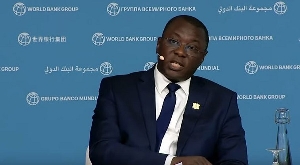Minister of Finance Dr. Mohammed Amin Adam has charged central bank governors to integrate climate risks and opportunities into monetary policies and financial regulation practices.
This, he said, is necessary to fortify economies against climate-induced vulnerabilities and catalyse a transition to a green and climate resilient economy.
“Our central banks are uniquely positioned to lead this transition by embedding climate risk assessments into our macroeconomic frameworks,” he stated in his opening remarks at the V20 Finance Ministers and Central Bank Governors Working Group meeting at the ongoing World Bank/IMF Spring Meetings in Washington, where he doubled as Chair of the V20.
The V20, or Vulnerable 20, refers to countries hit hardest by climate change and financial crises.
The meeting, which is the inaugural one of this group after its establishment in 2023, brought together finance ministers and governors of central banks of the V20 Group chaired by Ghana.
Among other things, they discussed various topics, including climate risks and potential solutions, such as the implementation of a Global Shield Liquidity and Capital Facility (GS-LCF). This facility aims to safeguard local economies from collapse following natural disasters by offering hard currency liquidity commitments through central banks and local financial institutions.
This will ensure that SMEs and local households can access liquidity quickly and efficiently.
Dr. Amin Adam underscored the connection between climate change and economic policy, warning that overlooking this linkage could result in severe consequences for countries. He stressed the importance of incorporating climate risks and opportunities into monetary and economic policies to mitigate potential adverse impacts.
Later in the day, the Finance Minister also chaired the V20 Ministerial Dialogue on ‘Unlocking Growth and Prosperity through Innovations in Climate Finance and Debt’.
In his opening remarks, he pointed out that V20 countries should not lose sight of the unparalleled opportunities for innovation, resilience and collective action despite the unprecedented climate challenges being experienced worldwide.
“I am acutely aware of the responsibility that rests on our shoulders. The Vulnerable Twenty Group, representing economies disproportionately impacted by climate change, stands at the forefront of advocating not just to survive, but to thrive in the face of these adversities,” he stated.
This dialogue brought together V20 finance ministers, G20 finance ministers, private sector, bilateral donors and philanthropies as well as Mohamed Nasheed, Secretary-General of the Climate Vulnerable Forum and former President of Maldives.
Among other things, the dialogue aims to build support across all stakeholders for official recognition by the IMF for V20 as an official inter-governmental group and build consensus on implementation opportunities of the climate prosperity plans.
Dr. Amin Adam’s charge is consistent with experts who caution that as global temperatures are projected to approach a 1.5ºC increase in the coming decade, the most vulnerable nations will face increasingly dire consequences unless decisive action is promptly taken.
Already, it is estimated that V20 countries have lost an estimated 20 percent of their wealth over the past two decades due to climate change, translating to roughly US$525billion. The most affected countries within the V20 have seen their economic growth cut in half due to climate impacts.
Business News of Friday, 19 April 2024
Source: thebftonline.com

















